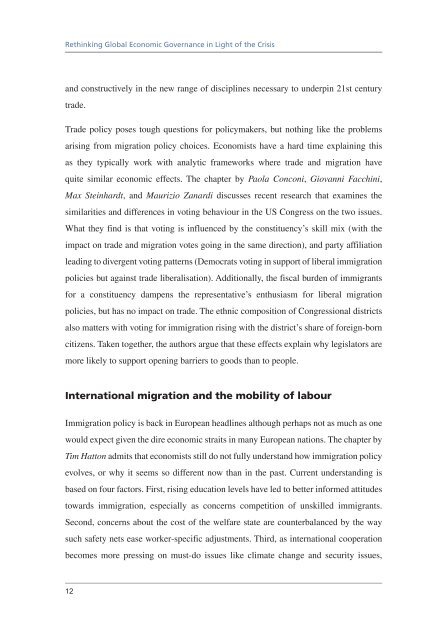Download PDF - Vox
Download PDF - Vox
Download PDF - Vox
- No tags were found...
Create successful ePaper yourself
Turn your PDF publications into a flip-book with our unique Google optimized e-Paper software.
Rethinking Global Economic Governance in Light of the Crisisand constructively in the new range of disciplines necessary to underpin 21st centurytrade.Trade policy poses tough questions for policymakers, but nothing like the problemsarising from migration policy choices. Economists have a hard time explaining thisas they typically work with analytic frameworks where trade and migration havequite similar economic effects. The chapter by Paola Conconi, Giovanni Facchini,Max Steinhardt, and Maurizio Zanardi discusses recent research that examines thesimilarities and differences in voting behaviour in the US Congress on the two issues.What they find is that voting is influenced by the constituency’s skill mix (with theimpact on trade and migration votes going in the same direction), and party affiliationleading to divergent voting patterns (Democrats voting in support of liberal immigrationpolicies but against trade liberalisation). Additionally, the fiscal burden of immigrantsfor a constituency dampens the representative’s enthusiasm for liberal migrationpolicies, but has no impact on trade. The ethnic composition of Congressional districtsalso matters with voting for immigration rising with the district’s share of foreign-borncitizens. Taken together, the authors argue that these effects explain why legislators aremore likely to support opening barriers to goods than to people.International migration and the mobility of labourImmigration policy is back in European headlines although perhaps not as much as onewould expect given the dire economic straits in many European nations. The chapter byTim Hatton admits that economists still do not fully understand how immigration policyevolves, or why it seems so different now than in the past. Current understanding isbased on four factors. First, rising education levels have led to better informed attitudestowards immigration, especially as concerns competition of unskilled immigrants.Second, concerns about the cost of the welfare state are counterbalanced by the waysuch safety nets ease worker-specific adjustments. Third, as international cooperationbecomes more pressing on must-do issues like climate change and security issues,12














